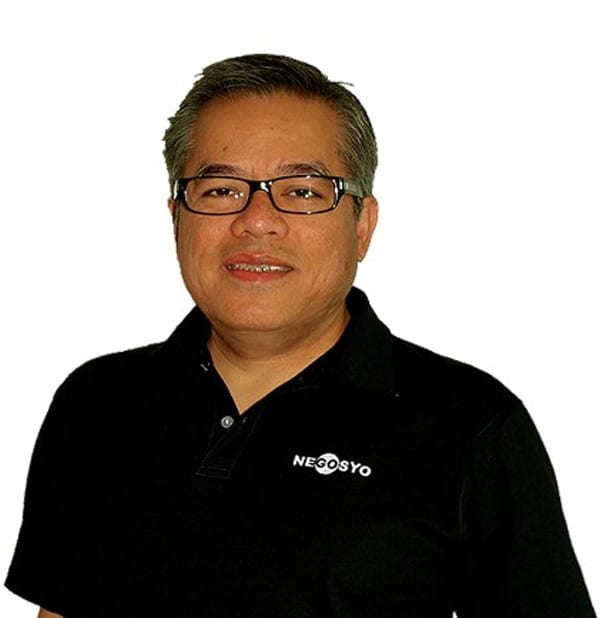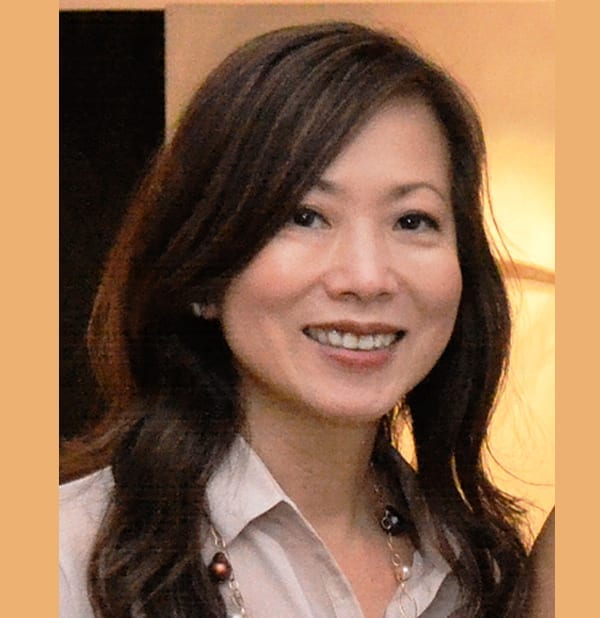
Q1: Joey Concepcion and you are the movers behind Go Negosyo. You also work together in RFM as his VP for Corplan. What are the secrets of working well together for over 20 years?
These are not really secrets but I guess it is more of having shared vision and goals on what we want to achieve, both for RFM and Go Negosyo. Of course in our company RFM, we both work on pushing for continuous growth, innovations and stronger market share leadership.
In Go Negosyo, we both strongly believe in creating a country of enterprising Filipinos, empowering them with the right mindset, competencies and knowhow which will be the real solution to poverty. Entrepreneurship education is key and sharing these to the youth and the underprivileged sectors of society like the micro-entrepreneurs, rural communities, poor women, out of school youth, PWDs, giving them free seminars and mentorship, giving them hope and opportunities to level-up can help them move up in life. These are just some of the beliefs we share and thus move in unison and in one direction.
We also help push for entrepreneurship development advocacy through participation in various fora, processes/ hearings for policy and laws formulation, education curriculum development and thought leadership.
There may be different ways to approach the advocacy and we discuss those and agree on some and disagree on others. For example, he would prefer to have huge Summits with thousands of attendees to maximize the high level of programs we prepare for a Summit, while I would tend to propose more of the lecture-type seminars with smaller number of attendees, for more incisive workshop and mentoring. In that example, we then agreed to do both but in sequence, and with different target-segment of attendees, location and frequency. There would be constant deliberations, pros and cons, but there will always be decisions that we will eventually have to agree on to move things forward for execution.
We also have similar styles and approaches in addressing issues and problems, perhaps like having the same values and a positive mindset, since we both espouse it in the advocacy. We have been open to all possible solutions and opportunities. We brainstorm a lot and we meet almost everyday. We always assess status of programs and projects and react fast to find solutions or agree on the next process like doing more research to help in decision making or even changing plans depending on developments.
We also complement each other such that Joey may come up with the idea and we handle the programming and execution, with step by step details. Since he is also a hands-on guy, he would often times get involved in fine-tuning the plans and seeing thru the implementation.
Q2: Go Negosyo holds many conferences, recognitions and book launches yearly with tens of thousands of people attending. What do you think are critical success factors to get things done as planned?
Partnership. Partnership with several sectors and stakeholders, like minded entrepreneurs, corporate partners, institutions like PFA AFFI, government, NGOs, media networks like DZRH PTV4 Businessworld Philstar Inquirer Rappler, Mansmith and Fielders and entrep gurus, functional experts and mentors like you or what we call Go Negosyo Angelpreneurs who all believe in our cause of empowering others to level-up. We also developed special partnership with schools, youth organizations, micro entrep organizations and various groups which would send delegates who they know can benefit from our programs. We also enjoy the support of youth volunteers and partner-school organizations for the big summits we conduct.
Getting their trust, cooperation is important, making sure it’s mutually beneficial to all parties to the point of even going the extra mile to make sure our partners are satisfied with the arrangements. Sustaining very good relationship with partners assures a continuing program.
Planning well with the very organized and motivated Go Negosyo team who would have their specific tasks and deliverables. The team is composed of relatively young and motivated advocates and staff, who also have the passion to play a role in promoting an entrepreneurial culture and competencies in the country. We follow a template of checklist, timelines, responsible units. Frequent review and quick decisions if there are challenges met. Having a back-up plan would of course be necessary.
Q3: What is your most memorable execution blunder in events which became the most important lesson for your team in subsequent runs?
We are fortunate to have good runs of our programs and Summits. What I could think of as a blunder would be underestimating the number of attendees in one of the Summits about 3 years ago where we prepared for just 2 halls but the attendees came in droves when unfortunately some were denied access to entry by the management of the venue for safety reason. Despite our appeal with the venue management, they had to apply strictly their rules to prevent accidents. The affected attendees got frustrated and left the Summit and we apologized to them but we did our best in convincing the venue management to relax their limits. I recall that that was the year when there were people who got hurt in a stampede in another event of another group early that year so the venue was so strict. In another occasion, the venue lent us a third hall so we could accommodate the excess attendees. The next Summit, we had to estimate better the crowd expected to attend and plan for the right size of the venue.
Q4: How do you build the capabilities and competencies of your people in Go Negosyo? How is that different in RFM?
Their competencies and capabilities are naturally developed because they are present in all these empowering seminars that we organized. I kid them that after hearing many of those runs, they can already teach those topics we cover, like success factors cited by many entrepreneurs, approaches to business problems, how to innovate and renovate, franchising, how to develop an entrepreneurial mindset, spotting opportunities, product development, marketing, financial literacy and business finance. Of course, it wont be that easy to replicate the lectures and we leave it to the experts to handle it. But they are learning definitely along the way.
We also let them attend development programs given by other groups that can help them in competency and personal growth.
Q5: Can you give any tips on avoiding miscommunication and unfounded assumptions in event organizing?
Regular huddle on the checklists and review of the status and acting quickly on pending issues. As you get close to the date of the program execution, it will have to be a daily huddle on the status and checklist. We would also have production meetings where all parties attend, including our suppliers say of technicals, production, lights sounds, panels, venue etc. For bigger Summits, we would also do a simulation dry-run of how the program will flow, the movements of the crowd, the people on stage and so on.
Using technology like group chats/ egroups, having direct communication, cutting the layers and bureaucracy, calling the person concerned, on top of texting the person. Full disclosure of the plans, constant update to the entire team so everyone is in the loop especially if there are revisions or new updates.
Q6: How is coordination done in your events? What is your setup like? How else can this be improved?
We are a relatively small and flat organization so we all meet as a team to discuss the programs and have closer coordination. Technology or apps for group chats also help a lot for real time updates.
Q7: Your job requires you to have many collaborations and alliances. Which collaborations are you most excited about ?
Collaborations with other enablers as we all plan and roll out programs that help others. Entrep education enablers who are making a difference in the lives of others, providing knowhow to the most in need, which perhaps could not have been available or would be costly for them to avail elsewhere. I also like working with our corporate and institutional partners as we try to provide solutions to other entreps to help them improve efficiencies, upgrade their business model to have better value proposition to their markets.
Q8: In your experience, what are keys to success of collaborations and alliances?
Shared vision beliefs values to empower others
Relationship based on Trust sincerity and mutually beneficial programs

